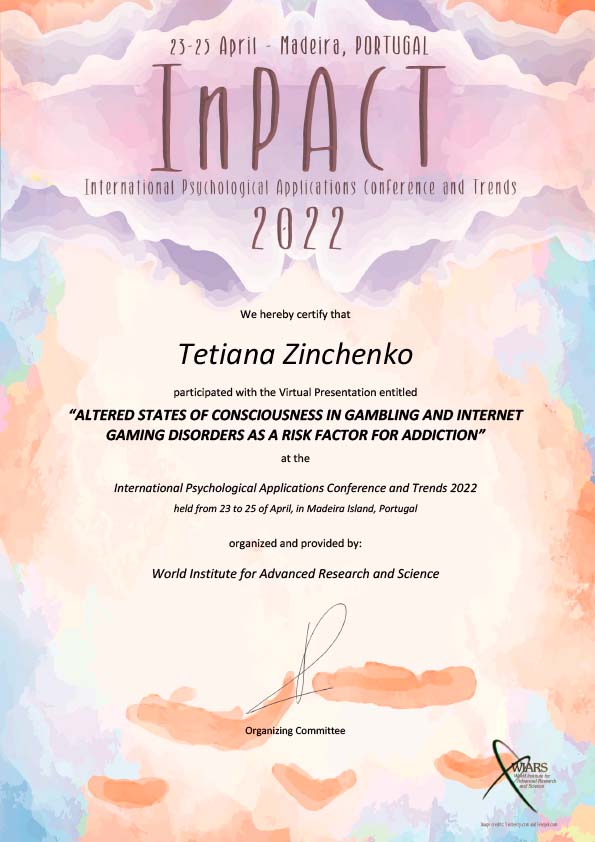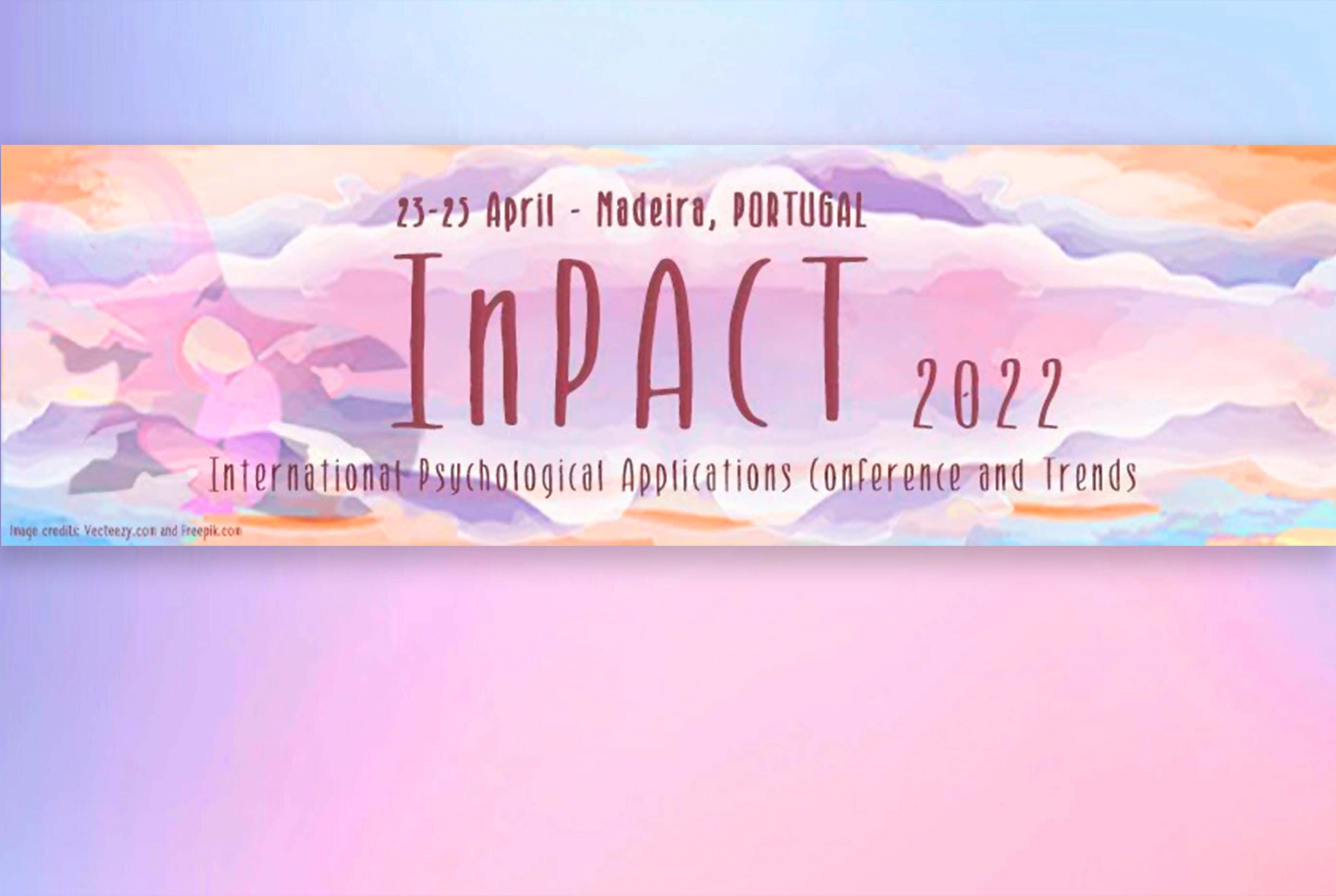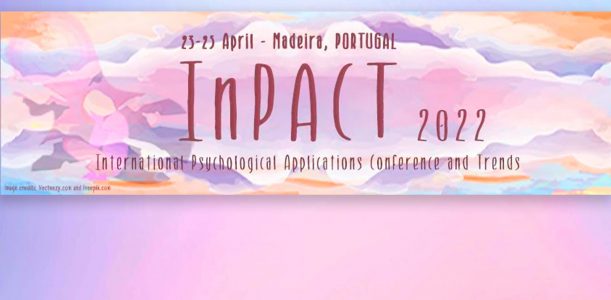The International Psychological Applications Conference and Trends (InPACT) 2022 was held in Funchal, Madeira Island, Portugal, from 23 to 25 April 2022. This global event was organized by the World Institute for Advanced Research and Science (W.I.A.R.S.).
InPACT 2022 received 364 submissions, from more than 35 different countries all over the world, reviewed by a double-blind process. Submissions were prepared to take the form 121 submissions (overall, 33% acceptance rate) were accepted for presentation at the conference in form of Oral Presentations, Posters and Virtual Presentations.
Website: http://www.inpact-psychologyconference.org
IASGA members Tetiana Zinchenko & Edward Shatochin also participated in this great event. They shared the results of extensive research that sheds light on behavioral information addiction’s nature and underlying mechanisms. The study was presented in a virtual presentation on the topic:
Altered states of consciousness in gambling and internet gaming disorders as a risk factor for addiction. (VP_155)
The abstract of this research can be found here on page 49:
http://inpact-psychologyconference.org/abstracts/
The full article you can be found on pages 262 – 266 here: :
http://inpact-psychologyconference.org/proceedings/
Their research focused on the role of altered states of consciousness and impaired player self-identity in the development of addiction and comorbid mental disorders. IGD, GD, and other behavioural addictions are unique in that there is no human brain exposure to a chemical substance, yet a severe addiction emerges. The results of this research point to the crucial role of mental imagery, which stimulates the emotions and desires of players and causes them to become fully immersed in virtual reality. Game companies use manipulative technologies and design techniques to make the virtual world of games more appealing to players of different ages. They create a space for illusory self-realisation in which people are likely to lose themselves and lose interest in real life and communication with family and friends. The imposed images stimulate the desire to get involved in the game again and again. MRI studies show the profound functional and structural reorganisation the brain undergoes under the influence of information. The player’s consciousness generates vivid volumetric images even when not playing.
The results of the study show the following sequence of events:
– images broadcast by an information product, such as a game or advertisement, stimulate the emergence of internal mental images in the player’s mind
– mental images, in turn, stimulate the appearance of certain emotions and desires. Their exact content depends on the events occurring during the game
– desires and emotional states drive a player to continue playing and stay involved in the game
– the images hypnotise the player in play, and their self-identification changes through unconscious imitation. He partially or wholly merges with the character of the game – the avatar, game, or online image. In such a state, a person, and even more so a child or adolescent, becomes fully suggestible. As a result, their worldview and value system change.
In this way, a dependency is formed, as demonstrated by numerous studies of functional and structural changes in the brain of addicted players. Initially, a person engages in the game to experience desired emotional states and satisfy their desires, albeit illusorily. These are mainly desires for easy money, recognition, a sense of superiority and importance, and the ability to succeed quickly and easily in the virtual world. Then, a person plays to escape the suffering caused by the growing negative social consequences of constant gambling: debts, problems in school, at work, with health, and dissatisfaction with the people around him.
– As a result of all of the above, the mental state deteriorates: existing mental disorders are exacerbated, or new ones join in.
Games addiction and other informational behavioural addictions result from the interaction of information products with the human mind.
The study showed the need for further comprehensive, in-depth research on gaming addictions, strict censorship of gaming industry information products, the development of new therapeutic approaches, and effective prevention measures.
A video presentation is available here:
As stated in the foreword to the proceedings of the conference:
«This International Conference seeks to provide some answers and explore several areas within the Psychology field, new developments in studies, and proposals for future scientific projects. The goal is to offer a worldwide connection between psychologists, researchers, and lecturers, from a wide range of academic fields, interested in exploring and giving their contributions to psychological issues.
The conference is a forum that connects and brings together academics, scholars, practitioners, and others interested in a field that is fertile in new perspectives, ideas, and knowledge. There is an extensive variety of contributors and presenters, which can supplement the view of the human essence and behavior».
The conference programme consisted of six main broad categories that covered a variety of research and application areas:
• CLINICAL PSYCHOLOGY
• EDUCATIONAL PSYCHOLOGY
• SOCIAL PSYCHOLOGY:
• LEGAL PSYCHOLOGY
• COGNITIVE AND EXPERIMENTAL PSYCHOLOGY
• PSYCHOANALYSIS AND PSYCHOANALYTICAL PSYCHOTHERAPY
The abstracts and full articles of all the research submissions can be found at the links above.
The book of Abstracts and book of Proceedings were edited by Prof. Dr. Clara Pracana (both from the Portuguese Association of Psychoanalysis and Psychoanalytical Psychotherapy, Portugal), and one by Prof. Dr.Michael Wang (Emeritus Professor of Clinical Psychology, University of Leicester, United Kingdom).
Video presentations are available at the following link:
http://inpact-psychologyconference.org/virtual-presentations/



